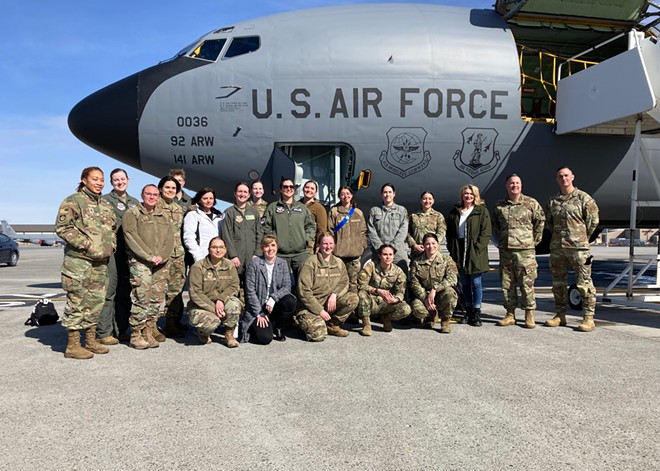
Fifty years ago, women had just been allowed to compete in marathons, a feat that had previously been considered too physically demanding for a female body.
Today, Senior Airman Kortney James is a Survival, Evasion, Resistance and Escape (SERE) specialist and instructor for the Air Force, one of the most physically and mentally demanding jobs in the U.S. Armed Forces.
James was one of about a dozen women honored by Fairchild Air Force Base during a special Women's History Month incentive flight. On March 9, an all-female maintenance crew readied a KC-135 Stratotanker to be flown by an all-female flight crew serving a group of all-female honorees.
Each woman on the four-hour flight was chosen by a supervisor for being "outstanding" in their respective jobs, from office work to active service. Women make up about 20% of the workforce at Fairchild.
But instead of working, the group got to take a Friday morning off and spend it hanging out at cruising altitude, wandering into the cockpit to watch the pilots (wo)man the controls and laying side by side with the boom operator as she refueled another Air Force jet midair.
"I love being able to come alongside other people in the military or outside the military and make them feel loved and supported," says Christina May, the wife of an active duty Air Force serviceman and the organizer of the flight. "I definitely know as a spouse, it can feel lonely. I can only imagine [what] that's [like] as an active duty member."
One of the reasons James chose SERE in the first place was because of the camaraderie the intense program breeds.
"The pipeline was really a team dynamic that I craved," James says. "I think that's what makes this job super unique — the connections that you make, and the people that you get to engage with and make pretty much lifelong relationships [with], regardless of how short they are."
James is small and compact, built but lean, with tightly curled hair neatly French-braided into pigtails. She's relaxed in the early morning, sipping on a bright pink energy drink. Her training has prepared her to survive in the Arctic and the desert, how to resist torture, how to keep herself going in desperate circumstances. She's now responsible for training other military personnel on how to do the same in case they get shot down, lost or captured behind enemy lines.
Yes, she can do a lot of pull-ups and push-ups. Yes, she's spent hours rucking through the forest. But the hardest part of the job isn't physical, she says. It's mental.
"Your mind ends up giving up before your body does, right?" she says. "People have so much more than what they think. I think that's why they push us so much through training. I don't think it could ever compare to somebody that's actually isolated. Because if we give up, then how are we going to teach? How are we going to be an advocate for an isolated person?"
"Your mind ends up giving up before your body does, right? People have so much more than what they think."
tweet this
James opens the pocket flap on the sleeve above her right shoulder. Inside, there's a small flipbook with a handwritten list on the first page.
"This is a notebook that I wrote three years ago," she says. "I always keep it with me. I wrote things that I felt I needed to hear from myself to push me along."
From an elite SERE specialist herself, here's some advice no matter who you are, where you are in life, or what you're trying to achieve:
1.) Just don't quit. "It's so simple. But as long as you don't quit, that's very powerful."
2.) Remember your own "why." "Everybody needs a purpose in their life, right? To go through any type of training, you need a 'why' behind it. If you don't have a strong enough 'why,' I feel like a lot of people don't make it."
3.) Be confident. "Confidence can bring you such a long way. You know the saying, 'Fake it till you make it?' A lot of times, we do that throughout life."
4.) Make small goals. "That way you can attain them, and it pushes you along further."
5.) You are more than your physical capabilities. "People are going to fail a lot. I fail sometimes once a week, if not every single day. I'm learning constantly. And that's what I love about this job — it's an exponential amount of knowledge that you get to learn."
6.) Imagine yourself already achieving your goals. "I saw myself being a specialist six months before I even joined. I said, 'This is what I'm going to be, this is what I'm going to do. How do I want to portray myself? How do I want to help others? That really led me to just push through."
7.) Know that you're good enough regardless. "That's an overall life thing. All of us just want to be enough, right? Regardless of what you go through, you're enough, regardless of what that looks like. That's a big one that I wanted to remind myself."
8.) Continue to help and guide others. "That was my overall purpose of joining — to guide and help others. That was sort of my 'why,' but my 'why' changed so much. It changed throughout training, but my overall feeling of value that I got from this job was guiding others and just making those connections."
9.) Remember that comfort is a silent killer. "I think that is something we can apply to life as well. Comfortability can destroy anyone. We have to continue to do things that are uncomfortable to push us along. That's just part of life." ♦























